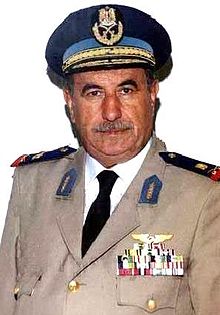Muhammad al-Khuli
| Muhammad al-Khuli محمد الخولي |
|
|---|---|

Official portrait, 1990
|
|
| Deputy Chief of the Syrian Air Force | |
|
In office 1964–1970 |
|
| Chief of Air Force Intelligence | |
|
In office 1970–1987 |
|
| Preceded by | post established |
| Succeeded by | Ibrahim al-Hwayjah |
| Chief of the Syrian Air Force | |
|
In office 1994 – June 1999 |
|
| Preceded by | Ali Malahafji |
| Personal details | |
| Born | 1937 (age 79–80) Beit Yashout, French Mandate of Syria |
| Nationality | Syrian |
| Religion | Alawite |
| Military service | |
| Allegiance | |
| Service/branch | Syrian Arab Air Force |
| Rank |
|
Muhammad al-Khuli (Arabic: محمد الخولي) (born 1937) was a career officer in the Syrian Arab Air Force throughout Ba'athist rule in Syria and during the presidency of Hafez al-Assad.
Al-Khuli was born in Beit Yashout in 1937 to an Alawite family descending from the Hadadeen tribe, near the coastal city of Jableh. Information on his early life is scarce, although it is known that he was not involved, nor interested, in the Ba'ath Party which took power in Syria in March 1963.
In 1964 al-Khuli was appointed Deputy Chief of the Syrian Air Force under Hafez al-Assad. When al-Assad ousted the government of Nureddin al-Atassi and Salah Jadid in 1970, he appointed al-Khuli Chief of Air Force Intelligence. Between 1971 and 1973 he underwent training in East Germany under both the GDR Air Force and the Stasi. Eventually, he gained the additional prominent position of Chairman of the Presidential Intelligence Committee. Under al-Khuli's leadership, Air Force Intelligence became a powerful apparatus largely independent from scrutiny and tasked with assignments beyond its traditional roles. Practically, it oversaw the nominating of posts throughout Syria's intelligence networks and those networks' undercover activities.
Following the attempted April 1986 bombing of an Israeli El Al plane in London's Heathrow Airport in what became known as the Hindawi affair, al-Khuli was dismissed from his intelligence post in 1987. He was transferred to his old post as Deputy Chief of the Air Force. Assad likely dismissed al-Khuli as a result of international pressure led by the United States and the United Kingdom, the latter of which had severed diplomatic relations with Syria as a result of the incident.
...
Wikipedia
